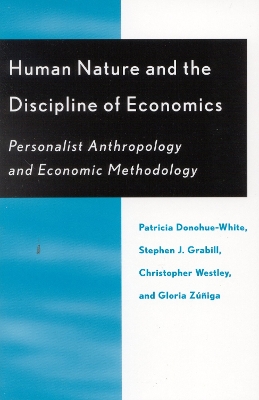Religion, Politics, and Society in the New Millennium
2 total works
The Free Person and the Free Economy
by Anthony J. Santelli, Jr, Jeffrey Sikkenga, Robert A. Sirico, Steven Yates, and Gloria Zuniga
Published 11 December 2001
Foundations of Economic Personalism is a series of three book-length monographs, each closely examining a significant dimension of the Center for Economic Personalism's unique synthesis of Christian personalism and free-economic market theory. In the aftermath of the momentous geo-political and economic changes of the late 1980s, a small group of Christian social ethicists began to converse with free-market economists over the morality of market activity. This interdisciplinary exchange eventually led to the founding of a new academic subdiscipline under the rubric of economic personalism. These scholars attempt to integrate economic theory, history, and methodology with Christian personalism's stress upon human dignity, humane social structures, and social justice. This final volume in the series systematically applies the praxeological (from the first volume) and theoretical (from the second volume) foundations of the personalist tradition to free-market economic theory. Unlike the previous two, this work defends economic liberty in theologically sensitive terms that reference the personalist tradition, without compromising the disciplinary integrity of either economics or social ethics.
Human Nature and the Discipline of Economics
by Patricia Donohue-White, Stephen J. Grabill, Christopher Westley, and Gloria Zuniga
Published 11 December 2001
Foundations of Economic Personalism is a series of three book-length monographs, each closely examining a significant dimension of the Center for Economic Personalism's unique synthesis of Christian personalism and free-economic market theory. In the aftermath of the momentous geo-political and economic changes of the late 1980s, a small group of Christian social ethicists began to converse with free-market economists over the morality of market activity. This interdisciplinary exchange eventually led to the founding of a new academic subdiscipline under the rubric of economic personalism. These scholars attempt to integrate economic theory, history, and methodology with Christian personalism's stress upon human dignity, humane social structures, and social justice. This second volume in the series surveys the anthropological foundations to the disciplines of economics and moral theology. The first part of the book presents an overview of the German, French, and Polish branches of personalist thought. Particular attention is given to theological anthropology, especially as it is developed by such thinkers as Emmanuel Mounier, Max Scheler, Gabriel Marcel, Karol Wojtyla, and Emil Brunner. Part two surveys models of human nature that have been espoused by various schools of free-market thought-including mainstream neoclassical economics. In conclusion, the authors demonstrate how an expanded understanding of human nature can augment the ability of economic science to model and predict human behavior.

